Dive Brief:
- Poor planning, complex contracting, a lack of accountability and high levels of collusion contribute to a “perfect storm for corruption” in the construction of international sports venues, according to a new study published by Engineers Against Poverty.
- Major multicountry events like the Olympics and the FIFA World Cup often require rapid construction of venues and surrounding infrastructure, leaving the door open for corruption and, as a result, huge cost overruns in major stadium projects, the report states.
- In order to fix the issues, EAP said, construction firms and owners on these projects should implement new tools for transparency, including a transparent tracking system that would help those involved identify red flags and allow the public to see how their money is spent.
Dive Insight:
Host countries often need extra infrastructure surrounding major events, beyond new stadiums. In recent years, Qatar hosted the World Cup, Russia hosted the Winter Olympics and the World Cup, and Brazil hosted the World Cup and Summer Olympics. Each required not only new sporting event locations, but also surrounding roadways, airports and hotels to support the influx of visitors to the events.
But the substantial costs of recent events — such as the 2022 Qatar World Cup, which is set to cost $222 billion, according to the report — aren’t justified by extra infrastructure alone, EAP said.
The high implementation costs have a direct impact on budgets as well, the report says. The 2010 South African World Cup’s (shown above) real cost was 1,709% above initial estimates. In Brazil, the 2014 World Cup’s stadium construction costs were 450% above predictions, as only two of the 12 arenas were delivered on budget.
The only mention of a domestic international sporting event in the report is that the U.S. spent less than $30 million on projects for the 1994 World Cup, far less than any of the subsequent World Cups.
The 2028 Summer Olympics will be held in Los Angeles.
The overruns can be attributed to a number of factors, the report authors wrote. Poor planning can result from the host selection process, wherein countries may have to quickly alter aspects of their bid, or change the scope on the fly to accommodate changes.
The challenges can lead to collusion, of which there is evidence, according to the report, that four construction firms responsible for most of Brazil’s World Cup and Summer Olympics infrastructure donated millions to the events funds prior to the country’s host selection.
The report lays out a roadmap for transparency, wherein corruption can be called out, and finances and spending are well documented. Additionally, partnering with a project planning facility — an organization designed to demand better project preparation — could reduce oversights and expensive changes.
Until measures to increase transparency and oversight are implemented, the report concluded, corruption will likely continue to run up taxpayer-funded budgets in host countries.













